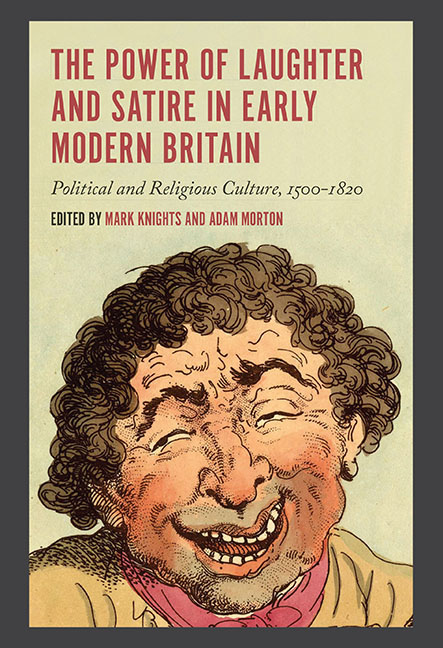Book contents
- Frontmatter
- Contents
- List of Illustrations
- List of Contributors
- Acknowledgements
- List of Abbreviations
- Introduction: Laughter and Satire in Early Modern Britain 1500–1800
- 1 Dissolving into Laughter: Anti-Monastic Satire in the Reign of Henry VIII
- 2 Mocking or Mirthful? Laughter in Early Modern Dialogue
- 3 Farting in the House of Commons: Popular Humour and Political Discourse in Early Modern England
- 4 Continuing Civil War by Other Means: Loyalist Mockery of the Interregnum Church
- 5 Laughter as a Polemical Act in Late Seventeenth-Century England
- 6 Spectacular Opposition: Suppression, Deflection and the Performance of Contempt in John Gay's Beggar's Opera and Polly
- 7 ‘Laughing a Folly out of Countenance’: Laughter and the Limits of Reform in Eighteenth-Century Satire
- 8 Nervous Laughter and the Invasion of Britain 1797–1805
- 9 ‘Was a laugh treason?’ Corruption, Satire, Parody and the Press in Early Modern Britain
- Bibliography
- Index
6 - Spectacular Opposition: Suppression, Deflection and the Performance of Contempt in John Gay's Beggar's Opera and Polly
Published online by Cambridge University Press: 01 September 2018
- Frontmatter
- Contents
- List of Illustrations
- List of Contributors
- Acknowledgements
- List of Abbreviations
- Introduction: Laughter and Satire in Early Modern Britain 1500–1800
- 1 Dissolving into Laughter: Anti-Monastic Satire in the Reign of Henry VIII
- 2 Mocking or Mirthful? Laughter in Early Modern Dialogue
- 3 Farting in the House of Commons: Popular Humour and Political Discourse in Early Modern England
- 4 Continuing Civil War by Other Means: Loyalist Mockery of the Interregnum Church
- 5 Laughter as a Polemical Act in Late Seventeenth-Century England
- 6 Spectacular Opposition: Suppression, Deflection and the Performance of Contempt in John Gay's Beggar's Opera and Polly
- 7 ‘Laughing a Folly out of Countenance’: Laughter and the Limits of Reform in Eighteenth-Century Satire
- 8 Nervous Laughter and the Invasion of Britain 1797–1805
- 9 ‘Was a laugh treason?’ Corruption, Satire, Parody and the Press in Early Modern Britain
- Bibliography
- Index
Summary
Life's a jest, and all things show it;
I thought so once, but now I know it …
John Gay wrote the above lines in a letter to Alexander Pope, and it appears on his monument as an epitaph. Whereas his friend Jonathan Swift claimed saeva indignatio in death, the cheerful Gay's last message seems to express contemptus mundi. It coincides in spirit with a letter he wrote to Swift just after the first publication of his Fables. ‘I expect nothing, & am like to get nothing’, Gay writes, then, further down the page, ‘[t]he contempt of the world grows upon me, and I now begin to be richer and richer, for I find I could every morning I wake be content with less than I aim'd at the day before’. My aim in this chapter is to explore whether there is anything more than a conventional ironic gesture in Gay's epitaph, or defensive false modesty in a letter to a more famous friend. In particular, I will explore whether contempt is a dominant passion in his notorious ballad operas of the late 1720s, The Beggar's Opera and Polly. The two plays were separated at birth for very different stage histories, the former being an unprecedented hit that ran for an entire winter season and the latter being banned on stage to circulate only in print until performed in 1777. Since then Beggar's Opera has been a staple of the English stage and Polly largely neglected. In 1728–29, however, the two plays were an almost continuous political event central to a broad programme of satirical dissent against the regime of Sir Robert Walpole. Rather than treating them as qualitatively different – a great work focused on London low life and a minor work set among pirates and plantations in the West Indies – this chapter will read them as they might have been understood, at least by supporters of the Viscount Bolingbroke's Patriot Opposition, as a single political and dramatic arc. That is, to put it bluntly, a spectacular arc of mocking contempt for the first and longest-serving prime minister.
- Type
- Chapter
- Information
- The Power of Laughter and Satire in Early Modern BritainPolitical and Religious Culture, 1500-1820, pp. 133 - 151Publisher: Boydell & BrewerPrint publication year: 2017

